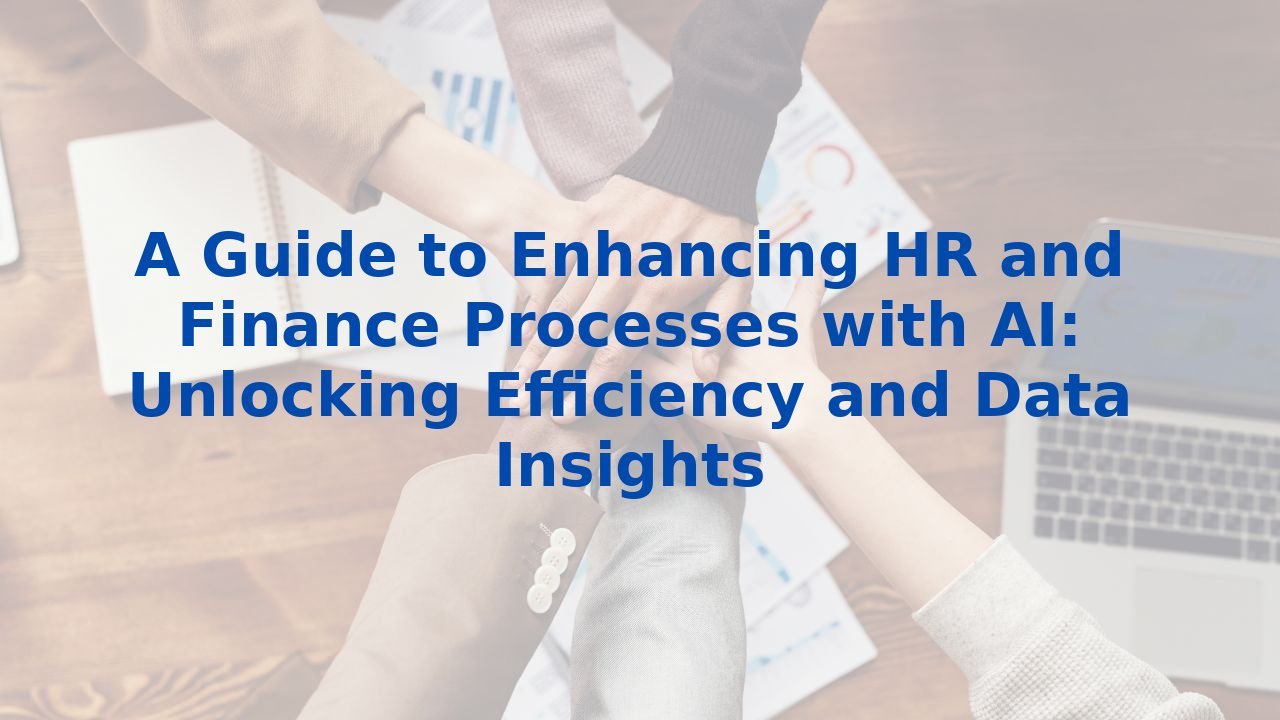A Guide to Enhancing HR and Finance Processes with AI: Unlocking Efficiency and Data Insights
A Guide to Enhancing HR and Finance Processes with AI: Unlocking Efficiency and Data Insights
Introduction
In today’s fast-paced business environment, the integration of Artificial Intelligence (AI) into HR and finance processes is not merely an option; it's a necessity. AI has the potential to not only streamline operations but also transform the way we analyze data, leading to enhanced efficiency and smarter decision-making. This guide explores how organizations can leverage AI for these critical functions.
The Role of AI in HR
Recruitment and Talent Management
Recruitment often involves a mountain of resumes and applications, making it a time-consuming task for HR teams. Here, AI can be a game changer. By automating the initial screening process, AI tools can sift through applications, identifying the best candidates based on specific criteria established by the organization. This significantly reduces the workload on HR professionals, allowing them to focus on strategic activities that foster talent development.
Moreover, AI-powered chatbots offer a revolutionary way to enhance candidate engagement. Providing 24/7 support, these chatbots can efficiently handle inquiries from candidates, guiding them through the application process and reducing the response time drastically.
Employee Engagement and Retention
The conventional methods of measuring employee satisfaction are often reactive rather than proactive. AI-driven analytics, however, provide HR teams the tools they need to identify trends in employee sentiment. By analyzing feedback and engagement metrics in real-time, organizations can implement targeted strategies to enhance employee experience. Additionally, predictive analytics can forecast turnover rates, encouraging proactive measures to retain top talent—essentially transforming HR from a reactive to a strategic function.
Performance Management
Evaluating employee performance is no longer a linear process. With AI, HR teams can utilize data from diverse sources such as performance reviews and project outcomes to provide a comprehensive evaluation of an employee’s contributions. AI tools can also offer personalized development plans, empowering employees to identify and achieve their career goals. This tailored approach to performance management not only enhances productivity but contributes to a more motivated workforce.
The Impact of AI on Finance
Financial Analysis and Reporting
Financial reporting has traditionally been an arduous task fraught with manual errors and inefficiencies. AI can automate these reporting processes, significantly reducing the time spent gathering and analyzing data. With the power of advanced analytics, finance teams can spot trends and anomalies far quicker than before, allowing for more informed decision-making based on real-time insights.
Risk Management
In an era where market conditions can shift overnight, AI’s capability to analyze vast amounts of financial data for potential risks is invaluable. By employing predictive models, organizations can accurately forecast financial outcomes and thereby make informed decisions that mitigate risk—ensuring that they remain resilient in uncertain times.
Compliance and Auditing
Keeping up with ever-changing financial regulations can be daunting. Here, AI’s continuous monitoring capabilities come into play. By automatically identifying potential compliance issues in real time, AI can significantly reduce the burden associated with traditional auditing processes, allowing organizations to focus their resources where they matter most.
Benefits of Training Employees for AI
Upskilling Workforce
Integrating AI into business processes is one thing, but successfully leveraging its capabilities requires a skilled workforce. Training employees in AI not only enhances their skills but also ensures that they are well-equipped to utilize AI tools effectively. This versatility increases their value to the organization while fostering a culture of continuous learning.
Enhanced Decision-Making
When employees understand AI and its analytical capabilities, they can leverage data insights more effectively. This understanding leads to better decision-making across departments. With a solid grounding in AI, employees are empowered to innovate, paving the way for strategic initiatives that drive organizational growth.
Adaptability and Innovation
In the fast-evolving digital landscape, adaptability is paramount. A workforce familiar with AI technologies is better positioned to embrace new innovations. This adaptability not only facilitates the implementation of new AI solutions but also encourages a creative environment where new ideas can take root and thrive.
Conclusion
Incorporating AI into HR and finance processes stands as a pivotal strategy for enhancing organizational efficiency and data analysis. By automating routine tasks, unlocking predictive insights, and enhancing decision-making capabilities, AI revolutionizes how businesses operate. Additionally, by investing in training programs, organizations can empower their employees, promoting a culture of innovation that is crucial for navigating the evolving landscape of modern business.
As AI continues to advance, embracing these technologies will be essential for organizations striving to maintain competitiveness and achieve their strategic goals.



